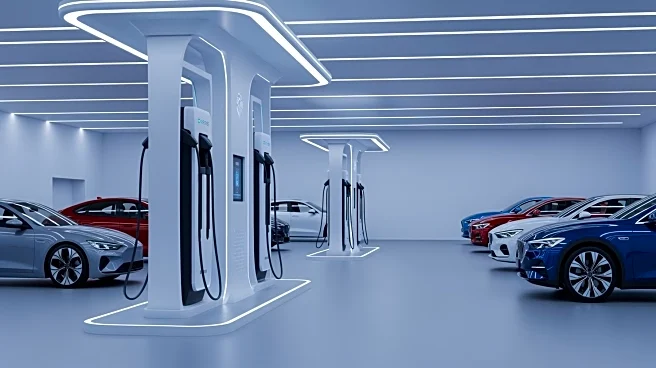What's Happening?
The U.S. electric vehicle industry is facing significant challenges due to policy changes under the Trump administration. The administration has reduced government support for the industry and engaged in a trade war with China, leading to a slowdown in demand
and a pullback by manufacturers. General Motors reported a $1.6 billion hit on its quarterly earnings due to decreased value in its EV operations, while Ford plans to focus on partial electrification rather than fully electric models. Globally, electric vehicle sales reached a record 2.1 million in September, driven by strong sales in China, which accounted for two-thirds of global sales. China benefits from government subsidies and infrastructure incentives, leading to overproduction and increased exports of electric vehicles.
Why It's Important?
The policy changes in the U.S. have significant implications for the domestic electric vehicle industry, potentially hindering its growth and competitiveness on the global stage. The removal of the electric vehicle tax credit has disincentivized production, leading to a predicted drop in demand. This situation contrasts with the thriving EV market in China, supported by government incentives and lower production costs. The U.S. risks falling behind in the global EV race, which could impact its automotive industry and economic power. The ongoing trade war with China further complicates the situation, as it threatens the supply of rare earth minerals crucial for EV production.
What's Next?
The U.S. electric vehicle industry may continue to struggle unless there is a shift in policy to support its growth. The trade war with China could escalate, affecting the supply chain for rare earth minerals and further impacting EV production. Manufacturers may need to adapt by diversifying their supply chains and exploring new markets. The global EV market is likely to continue growing, with China and Europe leading the way, potentially leaving the U.S. behind if current policies remain unchanged.
Beyond the Headlines
The U.S. automotive industry, historically a global leader, faces a critical test with the transition to electric vehicles. Failure to adapt could reduce its global influence and economic power. The trade war with China highlights the geopolitical complexities affecting the industry, with rare earth minerals as a key bargaining chip. The situation underscores the need for strategic policy decisions to support innovation and competitiveness in the U.S. EV market.

















